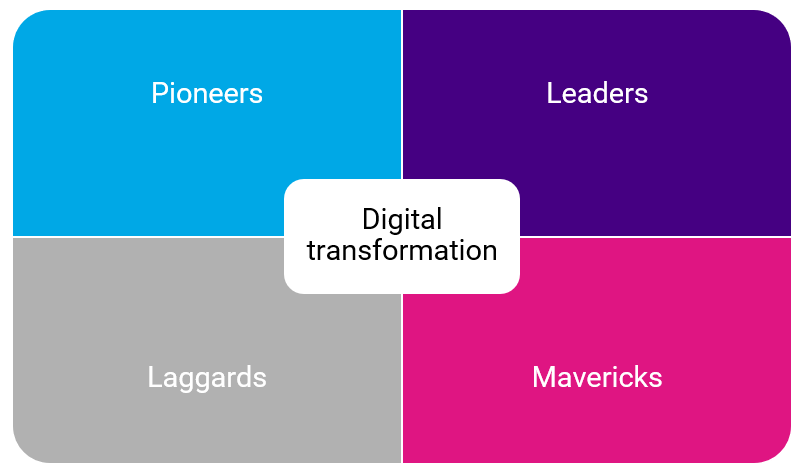These are two words that send a shiver down the spine of many a board of directors. Whisper it. “Digital transformation”. In some instances, there is a clear business case and a benefit to investing in new digital platforms and transforming interrelated processes and job roles. In others, there is either a security, technological or obsolescence need for digital projects. Either way, these initiatives are not for the faint-hearted. Since 70-80% of digital transformations are estimated to fall short of their objectives, it seems that digital transformation is leaving businesses all at sea. Read on to find out more.
What is digital transformation?
Digital transformation is the integration or enhancement of digital capabilities across organisational models, business units, processes and roles. This accelerated at pace during the pandemic as businesses thrust towards new and disruptive technologies. Primarily, the objective was to provide remote working infrastructure. Secondly, customers demanded and needed a ‘digital first’ customer experience. Thirdly, macroeconomic pressures and remote working increased the emphasis on productivity or at least to maintain it.
Remember that transformation aims to deliver long-term sustainable advantage whereas change tends to be short to medium term.
What are the benefits of digital transformation?
Research has repeatedly demonstrated the successful long-term sustained competitive advantage that is possible from successful digital transformations. New ways to serve customers, new routes to market and new experiences increase spend and loyalty. Disruptive, collaborative and predictive technologies enable increased productivity, increased innovation and increased opportunity to take the lead in new markets and products. In summary, a successful digital transformation enables new growth opportunities and the opportunity to align resources to where those opportunities are.
In contrast, a digital transformation helps businesses to avoid stormy weather by increasing margins, resiliency and productivity. It also helps if you understand your competitive landscape to identify the marketing and sales technologies required to succeed.

Why are digital transformations difficult?
Here lies perhaps the elephant in the room. Call it a challenge or an enigma, but that is exactly what it is for most management teams. For this reason alone, such digital projects are delayed or shelved. In normal circumstances, this may work for a few years with a business exhibiting stagnant growth or slow decline. However, the COVID-19 pandemic and a customer base trapped at home had other ideas.
So, how and why do management duck the big digital question? First of all, the cost of some digital investments is hard to justify without clear line of sight to benefit. Secondly, if the management team do not have a clear track record of successful digital transformations, investors or owners can be reluctant to invest. Thirdly, its hard to take your people on such a change journey when the reasons are unclear or poorly communicated.
In terms of the why, how many directors and senior managers want accountability for a failed digital project on their CV? Ultimately, directors have a tough decision to make. Accept the risk of a failed transformation and wasted investment that reflects badly on their career prospects or commit the organisation to slow growth and myopic strategic choices.
How to ensure a successful digital transformation
There are a few things that a business can do to increase the chances of success:
- Conduct a strategic analysis of your competitive position to validate what you want to achieve and how digital supports it
- Create the governance structure to support the digital project from approval of the investment through to final delivery
- Communicate what the project aims to achieve and the strategic rationale for embarking on the digital journey
- Agree the resources and the people required to execute the project and the objectives they will have to deliver
- Monitor and report on transformation progress for the board, investors and internal stakeholders to maintain momentum and address any obstacles
- Conclude the project with a formal acknowledgement of go-live and conduct a post-implementation review for learning and tracking of benefits
So, why does digital still leave businesses all at sea?
Here are seven possible reasons why digital transformations fail:
- Planning and preparation were insufficient.
- Resources were not adequate, allocated or aligned.
- Technological solution was incorrect.
- Communication and stakeholder management were inadequate.
- Governance of the project was ineffective.
- Complexity within the organisation was insurmountable (without proper steps to address it beforehand).
- Acceptance of failure.
A more successful digital transformation
When there is so much at stake during a large digital transformation, it pays to prepare. One way is to ensure that the rationale behind the investment is exhaustively researched and discussed. That way, you have a greater chance of making the right decision in the best way for the organisation. Second, you need to ensure that your executive team is aligned and motivated by the same transformational aspiration. This isn’t the time for a three-line whip from the CEO.
Finally, it is worth considering if the organisational approach to change and transformation is adequate. To elaborate, here is where some consultants will aim to get involved by selling their own transformation frameworks. Whether it involves a form of Agile, PRINCE2 or something else, embedding these methodologies and designing the organisational model to support it takes a long time. For some businesses that routinely embark on large-scale digital transformation, Agile or PRINCE2 makes sense. For smaller businesses that occasionally tackle big projects, good knowledge of programme governance and project management techniques may suffice.
A life raft for your digital aspirations
Here at Think Beyond, whether your transformation aspirations are small or large, we may be able to help. From strategic planning services to deep-dive industry, competitor and customer research, we can help inform the right choice. We can also act as a sounding board and a change agent when deciding on the best course of action. Our expertise in business, customer experience, marketing and sales enables a wide array of choices. In conclusion, we have a range of skills and experience to support your digital journey.
If you would like to discuss your digital transformation journey, simply call 01566 632206.
Alternatively, why not email us at sales@think-beyond.co.uk or ask us to call you back.
Finally, why not check out some of our other advisory articles and insights.

